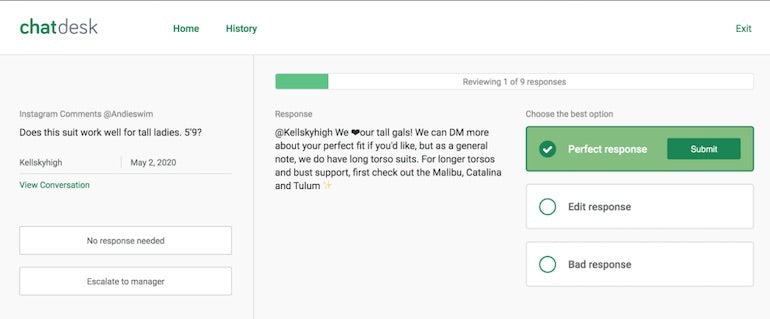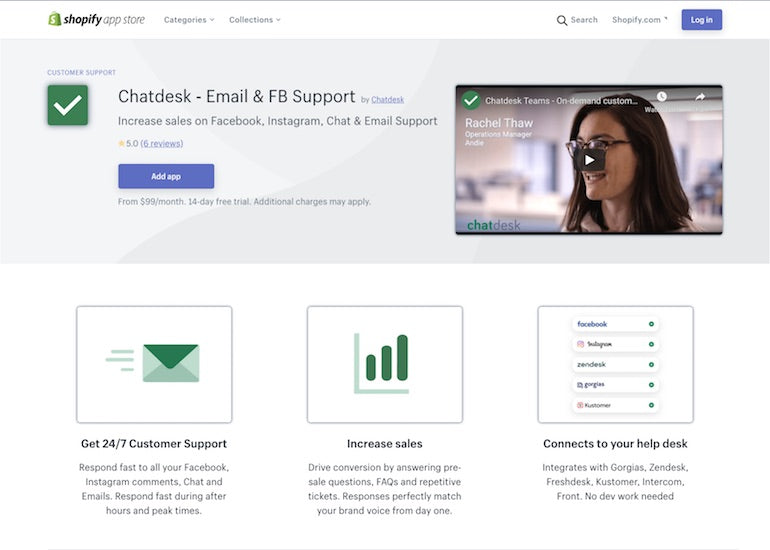The two words, “I quit,” are often either the most difficult, or the most cathartic, to say.
For Andrew Olaleye and Aneto Okonkwo, these words meant new beginnings—building a software company that would improve the digital customer experience and create new jobs.
“When Aneto and I started talking about starting Chatdesk, he said, ‘This has potential to create millions of jobs around the world,’” Andrew explains. “It got me really excited and a bit more willing to take that leap of faith, leaving a very secure opportunity with perks and going to somewhat of an unknown. But knowing that you have a chance to do something that could impact many, many lives makes it worth it.”
Quitting a secure, corporate job to launch a startup is a big leap of faith. Prior to co-founding Chatdesk, Aneto worked at Google for seven-and-a-half years as a product manager, developing products like voice search and Google Assistant. Andrew, a management consultant and engagement manager at McKinsey & Company, spent three years working with multinational corporations to overhaul their digital operations and improve their customer experience design, specifically focusing on call center operations.
“Aneto and I both had experience building digital contact centers and designing customer experiences,” Andrew says. “We saw firsthand many of the challenges in the customer support space such as waiting on hold, and the time and effort it takes to scale support teams.”
We saw firsthand many of the challenges in the customer support space such as waiting on hold, and the time and effort it takes to scale support teams.
Aneto and Andrew were introduced by a mutual friend at McKinsey, and connected over their shared Nigerian heritage and desire to make a positive global impact. Their conversations quickly became focused on solving problems around customer service and unemployment. It was the sweet spot where their professional and technical skills met their vision for a better world.
But quitting their jobs to start a company together wasn’t an overnight decision. In fact, it was almost a lifetime in the making.
Getting inspired: “Solve a global problem that makes you angry”
The vision driving Chatdesk started taking shape back in 2006. Aneto attended a talk by Elon Musk who shared that the inspiration for building Tesla Motors, SolarCity, and SpaceX came from a desire to address one of the world’s biggest problems: sustainability and the environment. Then, in 2012, Aneto’s sister delivered a TEDx Talk on her vision as a social entrepreneur, which is to work on a global issue that makes you angry.
“Inequality has been growing all around the world, and there's a lot of people who need jobs and income, especially now. We saw an opportunity to create more of that through customer service because it employs lots of people around the world,” Aneto says. “We saw an opportunity to solve that problem in this area, and that's what motivates us and what keeps us going.”
We saw an opportunity to solve that problem in this area, and that's what motivates us and what keeps us going.
Optimizing call center operations is a major undertaking. And scaling a customer service team to handle increasing demand can take weeks or months, considering the time it takes to onboard new employees. For small and medium-sized businesses (SMBs), the prohibitive cost and logistical headache of building a customer service team can stifle growth and frustrate their potential customers who need answers or help immediately.
You might also like: 5 Key Strategies to Improve Your App Support.
Making the decision to start
To validate their ideas and learn more about the challenges in digital contact centers, Aneto and Andrew conducted hundreds of interviews with companies in different industries.
“From these discussions, we found that scaling up customer support was a huge challenge, particularly during peak times like the holiday shopping season. Some companies spend up to three months on hiring and training new customer support agents, and we realized there could be a better way,” Andrew says.
But it was still a tough decision for the Chatdesk founders to leave their stable careers at Google and McKinsey and start a company from scratch. They also had to ensure they were the right fit as co-founders. Andrew was drawn to Aneto’s vision, work ethic, and drive, while Aneto saw Andrew’s process-focused personality, and strengths in sales, partnerships, and culture-building. They felt their strengths were complementary and could handle the stress of launching a startup together.
“Many companies will fail, not because of their product, but just because their founders are unable to make it work together,” Andrew says.
Many companies will fail, not because of their product, but just because their founders are unable to make it work together.
Aneto agrees, saying he thinks their similar backgrounds help to build trust.
“I'm Nigerian-American, and Andrew is Nigerian-American-Colombian, so we had a lot of shared family values that I think have helped to grow trust over the years.”
The leap into entrepreneurship
After months of conversations and research, they had developed a minimum viable product (MVP) and finally felt ready to make the leap from 9-5 to full-time entrepreneurship in September 2016. Working for companies where entrepreneurship is celebrated, their managers were excited to hear about their new venture and wished them all the best.
They got their first customer two months later and they haven’t looked back.
“We were basically going from great corporate perks and financial security to living on a tight budget and changing our lifestyles overnight!” Aneto says. “That said, we were really excited to take a leap of faith and start Chatdesk. We felt our previous experiences prepared us well for this moment.”
We were basically going from great corporate perks and financial security to living on a tight budget and changing our lifestyles overnight!
Today, Andrew and Aneto are the co-founders of Chatdesk, customer support software that helps companies respond to their customers faster through social media, chat, and email. Loyal customers or industry enthusiasts—“Superfans”—who know the brand voice are onboarded within hours, and use the Chatdesk platform to act as additional customer support representatives. Superfans solve customer tickets, answer pre-sale questions, and drive sales, often via social media. They also enable a company to offer 24/7 support, something many SMBs aren’t equipped to do.
“We have hundreds of Superfans around the world. They're all earning income, working from home on the Chatdesk platform, and providing support to the brands that they love,” Aneto says. “That’s very motivating.”
Using team trust and development as a driving force for success

Since 2016, Chatdesk has grown to about 80 employees, spread across different roles, such as engineering, data science, machine learning, sales, operations, and customer success.
For Aneto and Andrew, building a strong company means focusing on your team first, developing future leaders by creating opportunities from within. This strategy has been invaluable as the Chatdesk team has grown.
“You often find that entrepreneurs want to handle everything about their company because it’s their baby. But that’s just not scalable,” Andrew says. “You need to add other people to your team that are just as capable as you are. It really comes down to training and making sure that you're setting them up for success.”
Required reading for new managers includes High Output Management and The First 90 Days. And for customer development and sales roles, The Four Steps to The Epiphany, The Sales Acceleration Formula, and Predictable Revenue are all on the reading list.
“As we started growing, we had to trust our team. We’re there to make sure that they have everything they need, but we can’t do everything because it's just not going to be the best for the company's success,” Andrew says. “It’s also critical for your personal development as a leader and for the development of your team.”
You might also like: How to Market an App: 11 Expert Tips.
Shopify gets on Chatdesk’s radar
Aneto and Andrew are constantly hungry for feedback and insights—from both their team and their customers. And it was the feedback that increasing numbers of their clients were using Shopify that got them thinking more seriously about the commerce platform as an area where they could specialize.
Chatdesk joined the Shopify Partner Program in 2018 when the company sought to leverage the program’s global reach. Andrew attended Shopify Unite in 2019 as a Fellow, and made connections with Shopify Partners and Developers around the world.
“That was our entryway into Shopify. Over the past year or so, it's been great to just build relationships with other partners,” Andrew says. “We actually have partnerships with quite a few Shopify Partners where we co-brand and collaborate on content ideas, webinars, and sharing of best practices.”
And Chatdesk’s continuous development strategy has certainly paid off.
Small teams, small budgets, but big impact
Chatdesk proudly shares its 75 customer Net Promoter Score (NPS) in an industry where 40 NPS is average and 55 is considered best in class. Working with merchants like Andie, Ten Thousand, and Mented Cosmetics, Chatdesk initially carved out a foundational niche in the fashion and beauty industries, and has rapidly made inroads to food and beverage, furniture, and petcare.
“We did a lot of research about different industries and focused on ecommerce, specifically Shopify merchants. Chatdesk is designed for these fast-growing, direct-to-consumer companies that are SMBs,” Aneto says. “A lot of them have pretty small teams, so they don't have a huge budget for customer support. We help them solve the problem of scaling their customer support efficiently.”

Chatdesk now offers three solutions to support their customers: Teams, Shift, and Trends. Chatdesk’s customers have been reaping the benefits when it comes to customer service expenses as well, reducing service costs up to 80 percent despite enabling 24/7 customer support, and have received customer satisfaction scores higher than 90 percent, on average.
“We’re empowering small businesses to grow and provide an amazing experience for their customers,” Andrew says. “Many small businesses aren’t able to afford to bring on a full- or part-time employee to help with their chat volume, or respond to emails or ecommerce questions.”
We’re empowering small businesses to grow and provide an amazing experience for their customers.
As COVID-19 began to impact businesses of all sizes around the world, many SMBs shifted into survival mode. This became a serious challenge for the co-founders with a vision to reduce inequality through job creation. So they decided to think creatively about how to respond.
Build apps for Shopify merchants
Whether you want to build apps for the Shopify App Store, offer custom app development services, or are looking for ways to grow your user base, the Shopify Partner Program will set you up for success. Join for free and access educational resources, developer preview environments, and recurring revenue share opportunities.
Sign upEntering the Shopify App Challenge

In the wake of global disruptions caused by COVID-19, Andrew and Aneto’s vision of creating new jobs expanded to keeping existing businesses up and running. It was around that time they heard about the Shopify App Challenge and decided to submit their own entry.
“The Shopify App Challenge was the catalyst for us to get an app into the Shopify App Store. It was very timely because we’ve had a lot of customers impacted directly by COVID-19, and we were already thinking of ways to support them better," Aneto says. “So we invested more and pushed to get the app released as part of the challenge.”
The Shopify App Challenge was the catalyst for us to get an app into the Shopify App Store.
Their app is now live in the Shopify App Store. Once they finish analyzing the data and learn their lessons from developing and launching their first Shopify app, Aneto and Andrew plan on exploring how best to introduce their other solutions into the Shopify App Store.
In one of the earliest customer development conversations Aneto had with Shopify merchants, he received feedback that Chatdesk should be on the Shopify App Store.
“We honestly should have built the app sooner, because every Shopify merchant can use our tools, which are free to start,” Aneto says.
Participating in the challenge also inspired Aneto and Andrew to launch their own contest, the Chatdesk Small Business Challenge, where three businesses with fewer than 25 employees, and located across the US received free customer support for one month. The continuing rise in unemployment numbers in the US due to the impact of COVID-19 made them want to give back in a tangible way to small businesses struggling to keep up with digital customer service demand, and this was a great way to do so.
You might also like: How to Get Reviews for Your Shopify Apps.
From a leap of faith to brighter futures
Andrew and Aneto say they’ve started thinking more this year about how to accelerate Chatdesk’s growth as a company.
A common theme they keep hearing amongst their most trusted advisors and investors is to continue to build their brand through content and tell their company story. They’ll always be enthusiastic to share why they quit their comfortable jobs and built Chatdesk—to create millions of jobs to reduce global inequality, and to improve the digital customer experience.
They never lose sight of their “why” and encourage other entrepreneurs to do the same—for the good of their businesses and those around the world.
“Make sure you focus on something that you're very passionate about. A lot of people want to start a business just to start a business and be an entrepreneur,” Andrew says. “That can work, but being motivated by your passion for solving that problem is what it takes to get through all of the hard times.”
What next big idea are you working on now? Let us know in the comments below.

